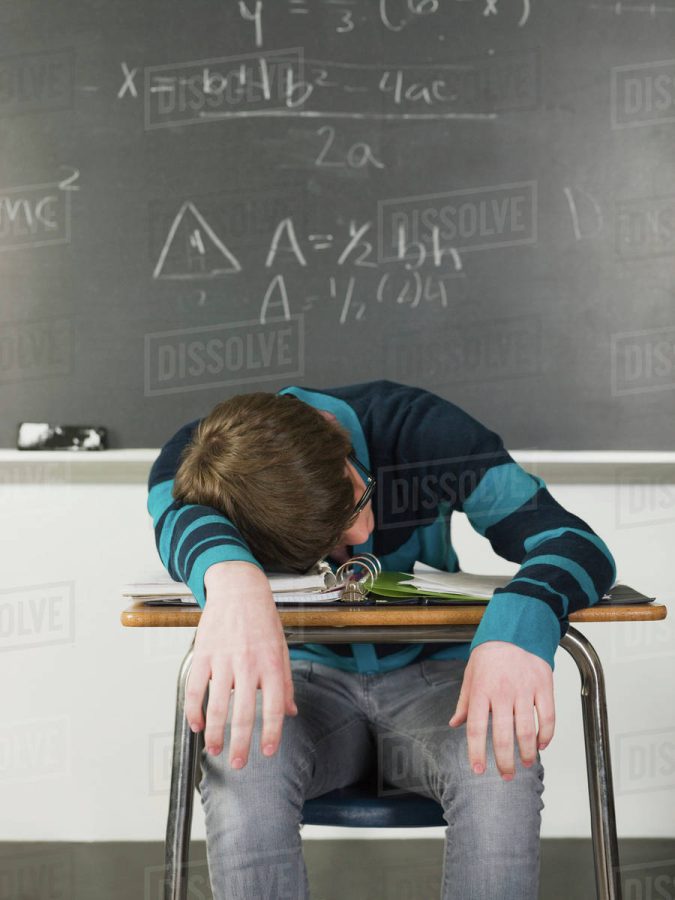What time should high school students have to wake up for school?
Students are exausted without proper sleep.
May 16, 2022
It is essential for a teenager to get the recommended amount of sleep each night. Poor sleep can put a person at risk for a variety of negative outcomes, including unhealthy eating habits, poor academic performance, elevated levels of stress, and more. Every night, high school students are told to receive between 8 and 10 hours of sleep. This is quite unlikely to happen. If a student got up at 6:15 in the morning, spent twenty minutes getting ready for school, and then spent ten minutes traveling to school, then in order for them to obtain the necessary amount of sleep, they would have to go to bed at 8:15 in the evening. This is unreasonable due to extracurricular activities, homework, eating meals, part-time jobs, and more. The average teenager gets only around 7 hours of sleep a night. This is mostly due to the early wake-up times required of them by high schools. The majority of high schools in the United States begin their day around 8:00 a.m.
Every morning at 7:25, students at Green Level High School are expected to be in their seats and ready to learn. It’s possible that you’ll think this is too early, but some buses begin picking up children as early as 6:00 in the morning, which is surprisingly an hour and 25 minutes before school even starts. The students who ride the first round of buses to arrive at school are required to wait in the cafeteria until the classes open at 7:00 in the morning, restraining themselves from falling asleep.
Inverting the timetables of schools, in my opinion, would bring a positive change upon children of all ages and would be quite beneficial. In my recommended schedule, high school starts and ends at the usual time elementary school does. Elementary schools start and end at the current time high school does, and middle school will begin and conclude at the same time.
Young children have more energy than teenagers do. This is a truth that is well known by many exhausted parents. Younger children typically have an earlier bedtime and wake up earlier in the morning than older children do. In addition, children in elementary school have access to recess, a significant amount of playtime, and work that is easier to handle. Students in high school, on the other hand, have an excessive amount of schoolwork, tests, and essays to write, on top of college applications, and more. After surveying a number of students at Green Level, I discovered that the average time they go to sleep at night is between 10:30 and midnight. This is after participating in extracurricular activities, playing sports, completing schoolwork, studying, attending a part-time job, and/or assisting with chores around the house.
According to an article published in The Red and Black, “The teenage brain produces the sleep-inducing hormone melatonin much later than the brain of their parent or younger sibling; therefore, the hormone stays active for longer partially explaining why teens are so groggy in the morning, they just aren’t built to wake up so early in the morning. Once at school, it takes many students a couple of periods to really wake up. It’s normal to see a student clutching a cup of coffee like it’s liquid gold during the first hours of the school day. Truth be told, it’s nearly impossible to concentrate on your morning classes when you’re half asleep.”
Is the solution, then, to let teenagers sleep in later on weekends than they normally would? No.
On the weekends, you shouldn’t sleep in longer or go to bed later because doing either of those things can further throw off their sleep schedule and leave them in a permanent state of a sort of jetlag. Instead, urge your teen to wake up early on weekends to help manage a sleep schedule.
We live in North Carolina, a state that experiences snowfall annually. It is dangerous for buses and cars to be on frozen roads at six in the morning during the seasons when the temperature is lower. Even if it might seem insignificant, ensuring that all children are safe should be extremely important. The students are put in a potentially hazardous situation for a number of reasons, not simply because of the cold weather.
Teen expert Amy Morin states, “Over 100,000 car accidents occur each year when drivers fall asleep at the wheel and fatigue-related accidents are most common in drivers under the age of 25. In addition to the risk of falling asleep while driving, chronically sleep-deprived teens may be inattentive and have slower reaction times which can increase their chances of being in an accident. Driving while tired is one of the 12 biggest dangers to teen drivers.”
The solution is to start school later so we teenagers can be healthier, work harder, and be smarter.
Both the educators and the students would benefit from this change in a number of ways.






